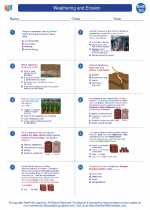Combustion Reactions
Combustion reactions are chemical reactions in which a substance combines with oxygen to produce heat and light. These reactions are commonly associated with the burning of fuels, such as wood, coal, gasoline, and natural gas.
Key Concepts
- Reactants: The substances that undergo a chemical reaction. In a combustion reaction, the reactants are typically a fuel (hydrocarbon) and oxygen.
- Products: The substances that are formed as a result of the chemical reaction. In a combustion reaction, the products are usually carbon dioxide and water.
- Heat and Light: Combustion reactions release energy in the form of heat and light, which is why they are used as a source of energy in many applications.
General Equation
The general equation for a combustion reaction involving a hydrocarbon fuel (CxHy) is:
CxHy + O2 → CO2 + H2O
Examples
Some common examples of combustion reactions include:
Study Guide
When studying combustion reactions, it's important to understand the following key points:
- Identify the reactants and products in a combustion reaction.
- Understand the role of oxygen in combustion reactions.
- Recognize the energy release (in the form of heat and light) in combustion reactions.
- Be able to balance combustion equations.
Additionally, it's helpful to practice writing and balancing combustion equations for different hydrocarbon fuels and understanding the environmental impact of combustion reactions, particularly the production of carbon dioxide and its role in climate change.
Remember to review and practice these concepts to solidify your understanding of combustion reactions.
[Combustion Reactions] Related Worksheets and Study Guides:
.◂Earth Science Worksheets and Study Guides High School. Weathering and Erosion

 Worksheet/Answer key
Worksheet/Answer key
 Worksheet/Answer key
Worksheet/Answer key
 Vocabulary/Answer key
Vocabulary/Answer key
 Vocabulary/Answer key
Vocabulary/Answer key
 Vocabulary/Answer key
Vocabulary/Answer key
